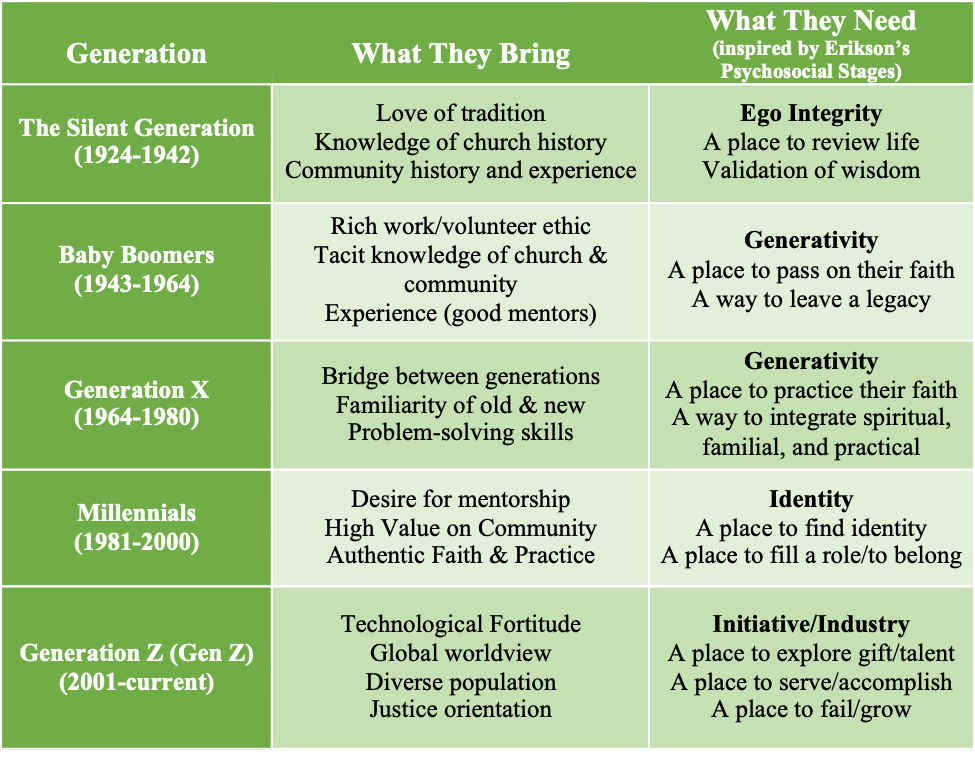My oldest daughter recently (jokingly!) said to me, “Okay Boomer…” when I was doing what she considered to be an “old person” thing (taking a selfie the wrong way…who knew?). I gave her my sternest “mom” glare and said, “Just to be clear, I’m not a Boomer, ‘kay? I am an X-er.” Her amused glance back at me had a “Whatever…” feel to it, but it did lead her to ask the question, “Who came up with the generations anyway?”
Now that’s a great question! Just where did the rules of the Generation Game originate? And how do they apply to intergenerational ministry in the Church?
Let’s start with the latter; What is intergenerational ministry?
Sometimes it is easier to describe what something is by exploring what it is not. Many people associate this term with children’s ministry or family ministry within the church. While those ministries may be partners in intergenerational ministry, the scope of these ministries are not broad enough. Intergenerational ministry encompasses the whole church, all generations, in a communal and corporate context.
Intergenerational ministry is more of a cultural characteristic than it is a ministry area; it is a culture that values & creates space for meaningful connections to be made across generational boundaries in a variety of settings for the purpose of generational discipleship.
Tweet
As the term implies, intergenerational ministry is an intentional approach to ministry that both allows for and encourages interaction between multiple generations in such ways as corporate worship, relational mentorship and lifelong community.
In order for a church to recognize the need for this generational connectivity within their faith community, the following question must be answered: What does each generation need from the church and what can each generation contribute to the church?
So, we have to ask, where did the generational labels originate?
Generational theory, the grouping of individuals into particular social groups with a shared identity predicated on the year of their birth and life experiences, began in the early 20th century and gained steam in the mid to late 20th century. Why? Marketing firms began to explore how to best market to specific groups, coining nicknames for them in order to create a collective conscious. In other words, they wanted to sell us stuff that they thought we wanted to buy.
Currently, the most likely generations that would be found in a given faith community would be the Silent Generation (born 1924-1942), Baby Boomers (1943-1964), Generation X (1965-1980), Millennials (1981-2000), and Gen Z (2001-current). These five generations offer unique experiences in both spiritual and communal practices for the church (see chart below). And that is how the generations fit into intergenerational ministry.
- The older generations bring a wealth of faithful testimonies, historical worship practices, and community-sustaining disciplines.
- The middle generations offer a bridge between past experience and current ones through experience with a vast array of communication tools from rotary phones to high-speed internet conferencing and the latest social media trends.
- The youngest generation offer the heartbeat of current culture and the application of spiritual truths in a dynamic cultural environment.
Likewise, each generation brings its unique needs to the church. The chart below uses Erik Erikson’s theory of psychosocial stages to outline these needs in a church setting.
- The older generations need to be needed; the desire for generativity and legacy-leaving are uniquely found in these generations and to be left isolated from those to whom their legacy can be left (the younger generations) is stifling and leads to stagnation.
- The middle generations are those seeking intimacy in deeper relationships with others, such as mentorship and discipleship, but if those opportunities are found lacking, will retreat into a placed of isolation.
- The youngest generations are looking for a place to be industrious (an important part of the community) and find identity (a role to play in the community); thus faith communities need to be intentional not just with providing safe and fun environments like Kid’s Church and youth group but integral participatory environments that allow for identity and industry to be rooted in the church.

Erikson’s stages derived from https://www.simplypsychology.org/Erik-Erikson.html
What does this all mean?
Simply this: As ministers in the local church, as members of the larger Body of Christ, we need to be aware that in our churches are multiple generations that bring multiple gifts and have multiple needs. Many of the ways to engage cannot be “programed” into the church experience but require us to creatively find space to relationships to be cultured and meaningful communication to take place. For ideas on how this can start to become a reality in your faith community, check out the links below.
There is a richness to be found in connecting the generations; let’s discover it together. Okay Boomer? 😉
If you’d like to explore some practical ways to begin making space for intergenerational worship experiences, click here.
Looking for practical ideas on how to (painlessly) connect the generations in your church? Click here.
Want to dig into what the Bible has to say about connecting generations in discipleship, community and worship? Here are a few links to check out:
A version of this article by the same author will appear in the Brethren in Christ Shalom! journal this summer.
For more information about
- Kids in Worship
- Determining which Type of Family Ministry model works best for your church
- Discipleship in Intergenerational community
- Encouraging the continued conversation through Practical Discipleship at Home
- Seminars, Workshops, Coaching
Check out to ReFocus Ministry or “like” our Facebook page. Join our conversation at theReFocus Family and Intergen Ministry group on Facebook.
About this Blog

Refocus Ministry was started by Christina Embree, wife to Pastor Luke, mom to three wonderful kids, and church planter at Plowshares BIC. She also serves as the Minister of Generational Discipleship with the Great Lakes Conference of the Brethren in Christ.
With years of experience in family ministry and children’s ministry, she is passionate about seeing churches partnering with families to encourage faith formation at home and equipping parents to disciple their kids in the faith. She recently graduated with a Masters of Arts in Ministry focusing on Family, Youth and Children’s Ministry at Wesley Seminary, she also blogs at www.refocusministry.org and is a contributing blogger at D6 Family, ChurchLeaders.com, and Seedbed
*The advertisements on this page are chosen by WordPress, not by ReFocus Ministry, and do not necessarily reflect the opinions and values of the author.



2 Comments